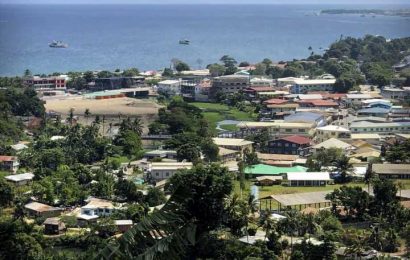JAKARTA, Indonesia — An Indonesian court sentenced a politically influential firebrand cleric to eight months in prison on Thursday for violating health protocols by holding gatherings attended by thousands of supporters during the coronavirus outbreak.
The panel of three judges at East Jakarta District Court, which was under heavy police and military guard, ruled that Rizieq Shihab had breached pandemic restrictions with events commemorating Prophet Muhammad’s birthday and the wedding of his daughter. He was also fined 20 million rupiah ($1,400) for a mass gathering in West Java.
The gatherings took place less than a week after his arrival from a three-year exile in Saudi Arabia. Shihab has been detained since Dec. 13. The judges ordered the time he has already served to be deducted from his sentence, meaning he will be free in several months.
Police detained dozens of Shihab’s supporters who tried to stage a rally in front of the court on Thursday to demand that he be released. More than 2,300 police and soldiers were deployed in and around the building, which was protected by razor wire and four water canons.
Shihab, 55, was the leader and grand imam of the now-defunct Islam Defenders Front, widely known by the Indonesian acronym FPI, which was once on the political fringes. It has a long record of vandalizing nightspots, hurling stones at Western embassies and attacking rival religious groups, and wants Islamic Shariah law to apply to Indonesia’s 230 million Muslims.
Shihab’s presence at several mass gatherings in his honor attracted large crowds, with attendees ignoring physical distancing rules and many failing to wear face masks.
Five other FPI members were also sentenced to eight months in jail on similar charges.
Prosecutors had sought a 34-month prison term and a three-year ban on Shihab holding a leadership role in any mass organization.
During the trial, which began in March, Shihab denied any wrongdoing and said he was the victim of political persecution related to his strong opposition to the Christian governor of Jakarta, Basuki Tjahaja Purnama, who is an ally of President Joko Widodo.
“This all is clearly political revenge that was wrapped and packaged in legal cases against me and my friends,” he said in his defense plea.
In an ongoing separate trial at the same court, Shihab is also accused of concealing information about his positive coronavirus test, which allegedly made contact tracing more difficult to prevent the virus’s spread.
The FPI has gained significant influence in recent years through humanitarian and charity work. It was a key organizer of massive street protests in 2016 and 2017 against Purnama, who was subsequently imprisoned for alleged blasphemy.
The movement against Purnama brought fringe Islamic groups into the political mainstream and rattled the government, highlighting the mingling of religion with politics in Indonesia, the world’s most populous Muslim-majority nation and third-largest democracy.
Shihab frequently criticizes government policies, and his statements often provoke controversy.
He was sentenced to seven months in prison in 2003 after the group vandalized bars in Jakarta. Five years later, he again was convicted and sentenced to one and a half years in prison for an attack on a religious freedom event at the National Monument Square in Central Jakarta.
Shihab left Indonesia in 2017 for a pilgrimage to Mecca shortly after police charged him in a pornography case and with insulting the official state ideology. Police dropped both charges a year later due to weak evidence.
He has called for a “moral revolution” since arriving back home on Nov. 10, fueling tensions with Widodo’s administration.
The government banned FPI in December, saying it had no legal grounds to operate as a civil organization and that its activities often violated the law and caused public disorder.
Source: Read Full Article


